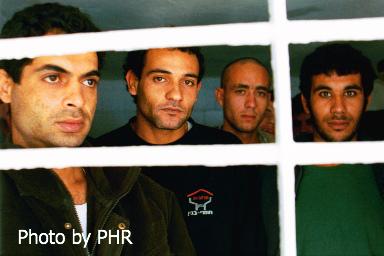AG, Supported by GSS, Seeks Disqualification of NDA Party from Israeli Elections; Right-Wing MKs Ask to Ban Three Arab MKs and Three Political Parties; Adalah to Represent All Arab MKs and Political Parties
On 19 December 2002, in an unprecedented move, Attorney General Elyakim Rubenstein submitted a motion to the Central Elections Committee (CEC) asking to disqualify the National Democratic Assembly (NDA) party from running in the upcoming Israeli elections. The Attorney General's submission to the CEC relies almost exclusively on previously “secret” General Security Service (GSS) materials about the activities of MK Dr. Azmi Bishara, the head of the NDA. As the Attorney General is an executive branch official and the GSS is directly subordinate to the Prime Minister, the Attorney General's move amounts to illegal political, governmental intervention in the legislative process.
The CEC has also been presented with motions filed by other right-wing MKs seeking to disqualify three Arab Members of Knesset (MKs) and three political parties from running in the 28 January 2003 elections in Israel. Challenges against all of the Arab candidates and political parties were submitted pursuant to Section 7(A) of the Basic Law: The Knesset. These motions claim that the goals and activities of the Arab candidates and political parties deny “the existence of the State of Israel as a Jewish and democratic state” and lend “support of armed struggle, of an enemy state or of a terrorist organization against the State of Israel.”
Adalah will represent all of the Arab political leaders and political parties before the CEC, and if necessary, before the Supreme Court of Israel. Adalah's reply briefs to the disqualification motions, including that of the Attorney General, must be submitted on 25 December 2002 at 10 a.m. The CEC will then schedule and hold hearings on these motions.
By 3 January 2003, the CEC will vote upon whether or not MKs Dr. Azmi Bishara (NDA), Abd el-Malik Dehamshe (United Arab List), and Ahmad Tibi (Ta'al), as individual candidates, may run in the elections. The CEC will also decide upon whether or not to ban three political party lists – the NDA, the joint Hadash-Ta'al list, and the United Arab List – from the parliamentary elections. The CEC, chaired by Supreme Court Justice Michal Cheshin, is comprised of 41 representatives of all political parties in the outgoing 15th Knesset. There are eight representatives of the Labor party, six Likud, five Shas, three Meretz, two Shinui, two Center, two National Union, two United Torah Judaism, and one each for all of the remaining parties. Five representatives of the Arab political parties are members of the CEC.
This election marks the first time that the CEC will decide upon the eligibility of individual candidates. This is due to a May 2002 amendment to Section 7(A) of the Basic Law: The Knesset. Section 7(A) is titled, “Prevention of participation in the elections.” According to this law, the CEC may disqualify a candidate or a political party list from running in the Knesset elections if the goals or actions of the candidate or party (i) deny the existence of the State of Israel as a Jewish and democratic state; (ii) incite to racism; or (iii) [offer] support of armed struggle, of an enemy state or of a terrorist organization against the State of Israel. This latter provision - “support of armed struggle” - was also added by the 2002 amendment to the list of grounds upon which candidates and political parties may be disqualified from running in the Knesset elections.
If the CEC votes to disqualify an individual candidate from participating in the Knesset elections in accordance with Section 7(A), it must forward its decision and arguments to the Supreme Court for approval. A CEC decision to disqualify a political party list, by contrast, is binding; however, Article 64 of the Elections Law (1969) provides that the list has the right of appeal to the Supreme Court. If the CEC decides to qualify or approve a political party list, the Attorney General and/or the Chairperson of the CEC and/or one-quarter of the CEC members may also appeal to the Supreme Court. Appeals to the Supreme Court must be filed by 5 January 2003.
The Supreme Court has ruled only once to disqualify an Arab political party from running in the Knesset elections. That ruling, in the Yardor case, was delivered in 1965 against the participation of the El Ard movement, prior to the enactment of Section 7(A). The Supreme Court must deliver final decisions on the qualification of candidates and political party lists for the upcoming elections by 9 January 2003.














